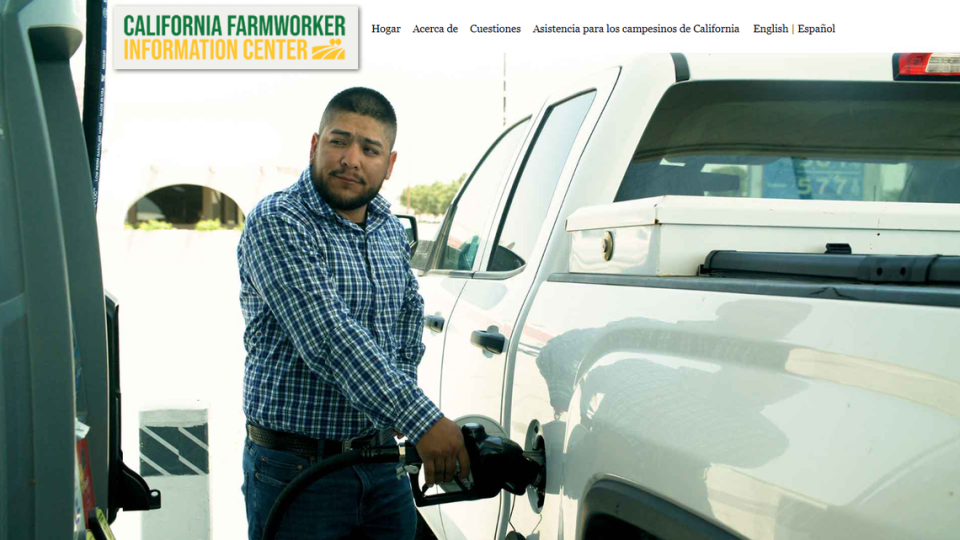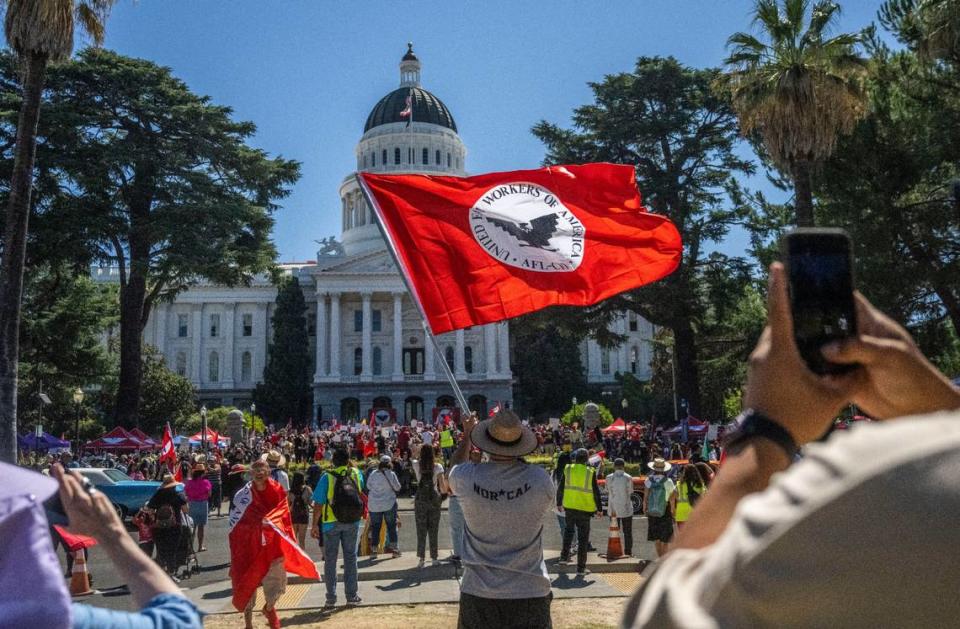Ag groups spend millions on ads to discourage California farmworker unionizing. What to know
Reality Check is a Sacramento Bee series holding officials and organizations accountable and shining a light on their decisions. Have a tip? Email realitycheck@sacbee.com.
Major agriculture organizations have combined forces to spend millions on Spanish-language radio advertisements discouraging farmworkers from voting in union elections.
Radio ads promoting anti-union rhetoric on multiple popular radio stations across the state and Spanish-language digital media over the past nine months have attacked a 2023 California “card check law” aimed to make it easier for farmworkers to vote in union elections. In some cases, the ads platform misinformation, according to labor experts.
Behind the majority of the radio ads is the California Farmworker Information Center, a registered nonprofit and charity founded in 2023 by executives from the Western Growers Association, California Fresh Fruit Association and California Citrus Mutual — all groups that opposed the “card check” law.
The group has spent nearly $2 million on “public education/advertising” in 2023 and expects to spend another $1.8 million combined over the next two years, according to May 2023 filings with the California Attorney General’s Office. Other organizations, like the California Farm Bureau and Farm Employers Labor Services, have also bought radio ads.
These anti-union ads are an attempt to combat the new legislation and blunt recent organizing wins.
The California Agricultural Labor Relations Board has received four election petitions since the law’s passing, which is far more than in recent years. The flagship United Farm Workers labor union is leading the way in organizing wins and recently won a historic certification vote at a multi-billion dollar agribusiness.
La Abeja, a newsletter written for and by California Latinos
Sign up here to receive our weekly newsletter centered around Latino issues in California.
Anti-union pushes by employers are nothing new. But what labor and law experts say is unique about these radio advertisements is the industry-wide effort to discourage unionizing.
“It’s very unusual in terms of its scope and reach,” said William B. Gould, a law professor at Stanford University and former chairman of the ALRB. “I would suppose that they’re concerned that some of the farmworkers might organize.”
UFW says its staff, members and non-union workers have identified ads on streaming services and 14 different Spanish-language radio stations across Bakersfield, Fresno, Monterey and Salinas.
The center reported using its funding for radio, digital media and print media advertisements but declined to confirm “strategic information” about its ad purchases. iHeartMedia Fresno/Modesto, which owns a number of Spanish-language radio stations, confirmed the center has purchased ad space over the past year.
“Growers pretending to speak for farmworkers is nothing new,” said Elizabeth Strater, UFW’s director of strategic campaigns.
In August 2023, UFW filed an unfair labor practice charge against the California Farmworker Information Center with the ALRB that is still pending. The charge alleges the radio ads “misrepresent union dues process,” constitute “voter suppression” and have a “chilling effect” on farmworker rights.
Hector Barajas, spokesperson for the information center, said the unfair labor practice charge had “no merit,” and the center is simply educating farmworkers on the impacts of the new law.
“We don’t get involved and take any positions on unions or union elections,” Barajas said.
What do the ads, website say?
“A union petition can lead to a union robbing 3% of your salary,” cautioned a radio advertisement playing on 94.5 FM La Suavecita, a Spanish-language radio station based near the border in Imperial Valley.
The ad, sponsored by the California Farm Bureau and Farm Employers Labor Services, ended with a warning: “Don’t let them.”
Bryan Little, a spokesperson for the California Farm Bureau and Farm Employers Labor Services, said the organizations aired ads in the winter of 2022 to educate agricultural employees on the new law.
“If you sign a union card, you give up your rights to a free and fair election and a portion of your salary,” said another ad months later on KDRA-FM (92.1), a station serving the Fresno area. “If you don’t sign the card, you protect your rights and your salary.”
This ad sponsored by the California Farmworker Information Center is particularly misleading, according to Ana Padilla, executive director of the UC Merced Community and Labor Center.
Signing a card does not equate to losing rights in the workplace, she said. Workers sign cards for representation in a bargaining committee that will negotiate with their employers on issues such as wages, benefits and workplace safety. They then conduct a vote to approve any agreements with their employers.
Barajas pushed back against the claims of misinformation. He said workers lose “rights” in a unionized workplace and must pay union dues which results in less take-home pay. Research, however, shows that unionized workers earn about 18% more on average than non-unionized workers.
More recently, the ads are directing people to resources on federal aid.
Last month, 103.1 Radio Lazer (KAAT-FM), another station serving Fresno, aired an ad telling people about the center website, infocampesinos.org, and said: “You can receive more than $2,000 dollars in aid payments and protect your salary.”
The group’s site, offered in English and Spanish, has a relief assistance page that links to a number of farmworker-serving and nonprofit organizations that can assist workers in applying for public COVID-19 aid.

The center’s website repeatedly reminds workers they don’t need to join a union to access federal aid. Bajaras said farmworkers with limited English proficiency and education are vulnerable to scammers, a common problem when people seek help filing immigration paperwork.
The website also falsely indicates farmworkers no longer have access to “secret ballot” elections. In response to questions about the site’s misleading language, Barajas said the new “legislation effectively eliminated farmworkers’ rights to vote in a secret ballot election.”
No staff members or individuals are listed on the website, and the only available contact information is a generic email, which did not respond to a request for comment.
Padilla called the website “concerning” as it simultaneously promotes the federal relief program and an anti-union campaign. She said it is another attempt to make workers mistrust unions by implying unions are using federal resources to coerce workers into signing cards.
The language in some of these advertisements mirrors the allegations filed last month by Wonderful Nurseries — part of the Wonderful Co., one of the largest agricultural companies in the world — which accused UFW of misleading workers to attend meetings and sign union cards with a $600 federal grant. The U.S. Department of Agriculture-funded $600 aid is available to farmworkers nationwide who worked through the pandemic.
Anti-union playbook
The California Farmworker Information Center was founded weeks after the passing of the 2023 law, according to state records. The center’s donors include its founding organizations and other agricultural organizations, Barajas said.
Prior to the legislation, farmworkers could only vote in secret ballot elections on their employers’ worksites, and unions had to inform the employer of intent to organize before the election. Proponents argued the new legislation would lessen employee retaliation and intimidation, while opponents said it would lead to forced unionization among employees.
Under the new UFW-backed law, farmworkers can now vote for union representation by providing their signature on a card. The union is certified by the ALRB if they reach majority support, or more than 50% of the workforce.
Daniel Hartwig, president of the member-based California Fresh Fruit Association, said education is needed for employers and employees alike on how the new law works and how it will be implemented. He did not directly comment on his affiliation with the information center. But he said the fresh fruit association “is not anti-union.”
Language in the association’s reports indicate otherwise. In its 2022-23 annual report, the CFFA called the new law a “paramount challenge” facing the industry.
“This fight will not be over quickly,” the report said about its employee education campaign on the new law. “It will be an engagement campaign that could span years.”
The association’s board chair Wayde Kirschenman said in the same report that “employers need to encourage their employees to be on alert and report any activity they notice by union activists to their supervisors.”
In an email statement, Kirschenman said his prior comments weren’t meant to imply that “employees should or would be required to notify their supervisors or employers” of any union activity.
“That was and has always been an individual’s personal choice,” he wrote.
The Agricultural Labor Relations Act, a landmark state legislation signed in 1975, grants agricultural employees the right to organize, farmworkers have the right to association “free from the interference, restraint, or coercion of employers.”
Cory Lunde, executive director of the Western Growers Association, and Casey Creamer, president of California Citrus Mutual, did not respond to requests for comment on the founding of the center.

The radio advertisements further a long history of anti-union tactics by employers.
Employers try to create divisions among their workers through various methods, including in-person consultants and media campaigns, and generate fear about the possibility of unions entering the workplace, according to Gaspar Rivera-Salgado, project director for the UCLA Labor Center. Union dues and decreased salaries are another common trope.
“This is out of the playbook,” Rivera-Salgado said. “It is very anti-union.”
Agricultural workers already have one of the lowest rates of unionization out of any private industry and historically face fierce opposition from the industry, outside groups and workers alike.
“Radio ads like this could have a chilling effect,” Padilla said.

